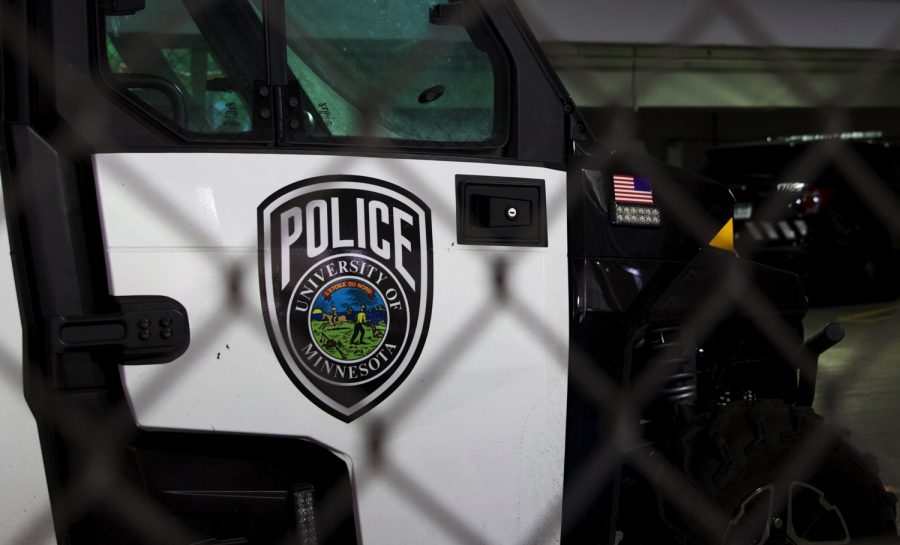
Five months after University of Minnesota President Joan Gabel announced an external review of the campus police department, Dr. Cedric Alexander presented his findings to the Board of Regents during its Feb. 12 meeting.
The report, released Jan. 26, has eight pillars, which include goals to build trust between the University community and University of Minnesota Police Department. The recommendations include the demilitarization of UMPD, which would “eliminate all military grade weapons, vehicles, ammunition, tear gas, except under certain conditions,” and a review of UMPD’s staffing needs. According to the report, Alexander spoke to over 200 people and held over 70 meetings in consultation for the review. Some students, however, are critical of the final product.
During Friday’s board meeting, Gabel announced the creation of the M Safe Implementation Team, comprising faculty, staff and students who will consider and effect Alexander’s recommendations. The nomination process is still taking place, she said.
According to Gabel, the implementation committee will be led by Dr. Kathy Quick, an associate professor in the Humphrey School of Public Affairs, and Dr. Mylene Culbreath, director of diversity and inclusion for the Graduate School Diversity Office.
“In order to really think about whether these recommendations are acted upon, or in what order or in what way, he recommends standing up an implementation committee, and we’re doing so,” Gabel said during the meeting.
During the meeting, Alexander spoke about balancing the needs of University community members who are concerned about crime and violence on campus with the needs of those who do not feel safe with the presence of UMPD.
Alexander noted that now that the report has been released, more difficult work on reforming UMPD has begun.
“There are no bad guys here. You have an outstanding police department that has done incredible work to work hard to try to build those relationships, but the challenges are still there,” Alexander said.
The University is working to immediately implement certain recommendations in the review, including installing body cameras, working with the mayors of Minneapolis and St. Paul to clarify the roles of UMPD, the Minneapolis Police Department and the St. Paul Police Department on areas around campus and placing the safety department under the purview of Senior Vice President Myron Frans.
One difficult aspect of the review is the disconnect between the data showing that UMPD has relatively few complaints and high satisfaction with the anecdotes and stories of students who have concerns about UMPD. One interpretation of this disconnect could be that students think they are interacting with UMPD as opposed to MPD.
“UMPD can be doing good work based on the data, and people can still be feeling unsafe. That can coexist. And so what we’re trying to do is find a set of evolutions, initiatives and engagements that help resolve that undeniable tension,” Gabel said.
Alexander stressed the importance of transparency within UMPD during the board meeting.
University community response
Some students have been critical of the nearly 60-page report, including Samiat Ajibola, the president of the Black Student Union (BSU).
The review was not in line with student activist requests to abolish or defund UMPD, she said.
Ajibola said while she felt Alexander listened to her and other student advocates during meetings in the fall, listening to activists is not enough; there has to be action following listening sessions.
“I believe that Black students on this campus specifically are tired of being told that [administrators] ‘hear us’ and that they ‘see us,’ but they continue to make steps to show the exact opposite,” Ajibola said. “I just believe [Alexander] may have heard us, and he listened to us, but he did not take it fully into consideration … because he completely disregarded the idea of defunding.”
BSU struggled to continue parts of its activism around the police while the review was ongoing, including an attempt to build a connection with UMPD, Ajibola said. During the fall, BSU asked the president’s office to speak with UMPD about the “current climate” of campus. According to Ajibola, the group was told to meet with Alexander directly because of the ongoing review instead of meeting with UMPD.
Andy Oien, an activist within the University’s chapter of Students for a Democratic Society (SDS), said that the review does not fulfill SDS’ demands for structural changes within UMPD.
Leah Spellman, a third-year graduate student at the University, is also critical of the review. She said she sees the review as proof the University is not listening to students, who have been advocating for the abolition of UMPD. Spellman has worked with SDS before but is not a member of the student group.
“The whole issue for me is that there’s still going to be a policing structure,” Spellman said. “Regardless of what they’re going to try and do and their actions moving forward, my hesitation is that they … still seem to want to maintain this idea that police are good and can be reformed when we’ve been telling them that you cannot reform a really deeply rooted racist structure.”
Anthony Scott, the president of the University’s Black Faculty and Staff Association, said that while the review is a great start, the University has more work to do for Black faculty.
“Because the review’s on public safety, it doesn’t address what we wanted to address as Black faculty and staff,” Scott said. “And that is protecting Black faculty and staff in terms of our ability to work at the University of Minnesota.”
"Review" - Google News
February 14, 2021 at 11:14PM
https://ift.tt/3qmpFEb
Community responds to UMN's external review of police - Minnesota Daily
"Review" - Google News
https://ift.tt/2YqLwiz
https://ift.tt/3c9nRHD
Bagikan Berita Ini














0 Response to "Community responds to UMN's external review of police - Minnesota Daily"
Post a Comment